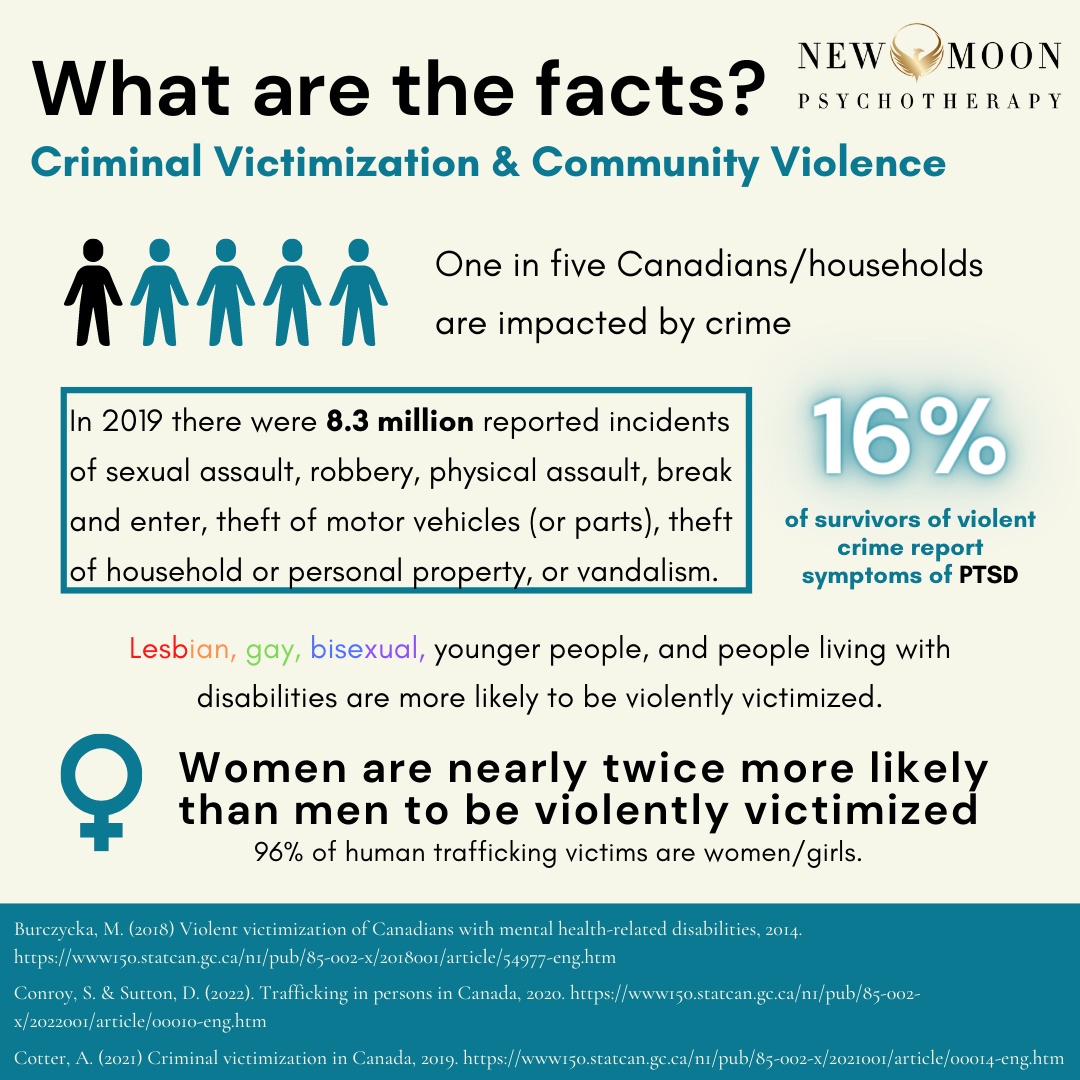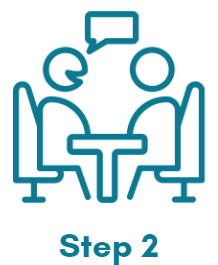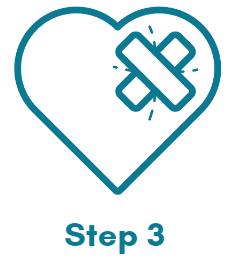What is Criminal Victimization/Community Violence
 Criminal victimization or community violence is an intentional attempt to hurt a single person or group of people.
Criminal victimization or community violence is an intentional attempt to hurt a single person or group of people.
If you have experienced, or witnessed, any of the following – you have experienced criminal victimization or community violence:
- Robbery, mugging, kidnapping, carjacking (involving or not involving a weapon
- Physical assault, shooting, stabbing, other assault involving a weapon
- Harassment, stalking, bullying
- Growing up with family involved in criminal activity or being personally involved in criminal activity
- Sexual violence is also a form of criminal victimization. You can learn more about it by visiting the Sexual Assault and Rape page.
Due to the intentional nature of these traumas, survivors of criminal victimization are at a heightened risk of trauma related difficulties such as post-traumatic stress disorder, complex trauma, anxiety, depression, and traumatic grief.
How does Criminal Victimization/Community Violence impact survivors?
It’s hard to live your life when you’re worried about survival.
Surviving criminal victimization such as an assault, robbery, or shooting can leave a permanent impact on the survivor. The same can be said for living in a community where criminal activity is common.
 Both criminal victimization and community violence is associated with changes in one’s thinking, emotions, behaviour, and nervous system.
Both criminal victimization and community violence is associated with changes in one’s thinking, emotions, behaviour, and nervous system.
For children who were raised where criminal activity and violence were common, their sense of safety and stability was disrupted. Consequently, they may find themselves living as teens and adults who are stuck in survival mode and notice that their outlook on life and sense of control has been challenged.
Here’s an in-depth look at common effects of criminal victimization/community violence:
Thinking:
- The world is unsafe
- People and others cannot be trusted
- They are responsible for what happened – could have stopped it
- They were being punished for something they previously did
Emotions:
- Intense anger, worry, and fear
- Strong reactions to small triggers
- Sadness, grief, shame and guilt
Behaviour:
- More safety focused behaviours (checking doors and locks, sleeping in the day, changing routes, etc.)
- Withdrawing from daily activities and people
Hypervigilance:
- Jumpy, easily startled
- fight-flight-freeze-fawn response
- Difficult concentrating and resting
Re-experiencing:
- Intrusive and unwanted memories and thoughts about the event
- Feeling you are back in the moment – able to see and feel as you did when it was happening (flashbacks)
- Nightmares
Avoidance:
- Common forms of avoidance are: drugs, alcohol, self-harm, or disordered eating
- Changing behaviour to avoid going back to where it happened, the activities that trigger flashbacks, and the people who were involved
- For example, someone who was driving when they were car jacked, may avoid driving, someone who was mugged when walking through a park may avoid green spaces, and someone who was bullied or assaulted at school may skip regularly or drop out altogether.
Children and teens who have experienced community violence or criminal victimization are often mislabeled as lazy or unmotivated, and believed to have behavioral difficulties. In realty, they are stuck in survival mode.
It’s impossible to thrive when your body and mind sense danger
Survivors often feel that they are alone – either that what they experienced cannot be understood by others or that there isn’t anything that can help them. This is the trauma speaking. Trauma is isolating and healing involves taking the challenging step of being vulnerable and speaking to someone about what happened and how it impacted you.
For survivors who have been involved in criminal activities themselves, there is further fear of betrayal or judgment. Everyone deserves to find freedom from trauma symptoms.
How can New Moon Psychotherapy help?
 While trauma is devastating, isolating, and wide reaching, it doesn’t have to be. Criminal victimization and community violence is all around us and we know that more people go on to resolve their trauma symptoms than those who go on to develop long-term complications. This is fantastic news because it means that it is possible to heal from your trauma, stabilize your emotions, think logically, regain control of your behaviours, and be able to live a meaningful and fulfilling life filled with connection and safety.
While trauma is devastating, isolating, and wide reaching, it doesn’t have to be. Criminal victimization and community violence is all around us and we know that more people go on to resolve their trauma symptoms than those who go on to develop long-term complications. This is fantastic news because it means that it is possible to heal from your trauma, stabilize your emotions, think logically, regain control of your behaviours, and be able to live a meaningful and fulfilling life filled with connection and safety.
At New Moon Psychotherapy, we are committed to guiding you through each step of your healing journey and use evidence-based therapies (the ones that research suggest work) to treat the difficulties that you’re experiencing.
Cognitive Processing Therapy (CPT)
CPT is especially useful if you’ve been avoiding thinking and emotions about the event and are experiencing changes in your thinking since the event. Some common thoughts are: “It’s my fault”, “I should/shouldn’t have done X”, “if I only X, then Y”, “I can’t trust others”, “the world is dangerous”, “Things won’t ever get better”. Treatment is typically 3-4 months.
Eye Movement Desensitization and Reprocessing (EMDR)
EMDR can be a powerful therapy because it works to changes how our brain stores our trauma memories. It can be especially helpful for people who experience recurring flashbacks or have a hard time speaking about their traumas. It involves a combination of talk therapy with non-invasive bilateral stimulation (following a sound, moving your eyes, or tapping your hands).
Prolonged Exposure Therapy (PE)
PE is especially useful if you’ve ben avoiding people, places, and things since the event. For example, if you’ve noticed that your behaviour has significantly changed since the event – such as taking the long way home, giving up hobbies, and spending less time with others, out of fear that doing so will bring up difficult memories, trigger a flashback, or put you in harm’s way, PE might be a good fit. Treatment is typically 3-4 months.
Dialectical Behaviour Therapy for PTSD (DBT-PTSD)
This is a novel therapy created for individuals who are experiencing co-occurring symptoms of borderline personality disorder (BPD) and complex trauma. Typically, individuals who benefit from this trauma therapy have experienced multiple traumas and are struggling to cope with this as well as BPD. Treatment is typically 8-12 months.
Sensorimotor Psychotherapy and Somatic Psychotherapies
 These are novel approaches to the treatment of trauma which are based on the belief that our bodies are impacted by our traumatic experiences (the body really does keep the score). They are drawn from research in physiology, neuroscience, psychology, and sociology.
These are novel approaches to the treatment of trauma which are based on the belief that our bodies are impacted by our traumatic experiences (the body really does keep the score). They are drawn from research in physiology, neuroscience, psychology, and sociology.
Somatic Psychotherapy can be particularly helpful for individuals who experience somatic symptoms following the traumatic event. For example – physical pain, hyperarousal and panic, unexplained illnesses, etc.
Sensorimotor Psychotherapy helps individuals become aware of how their bodies communicate emotions and give them more control over their emotions without having to talk about the distressing event.
Group Therapy
Group therapy allows survivors to learn and form community with other survivors as well as groups for loved ones who might be struggling with effectively supporting the survivor in their life. For teens, it’s important that the adults in their life also receive support so that they can reinforce a safety and create stability in the teen’s life.
Not every therapy will work for everyone at all points in time so it’s important to find the correct approach to meet your current needs. Don’t worry – you can leave this part up to us. When you reach out, we’ll ask you some questions and make some recommendations for you.





